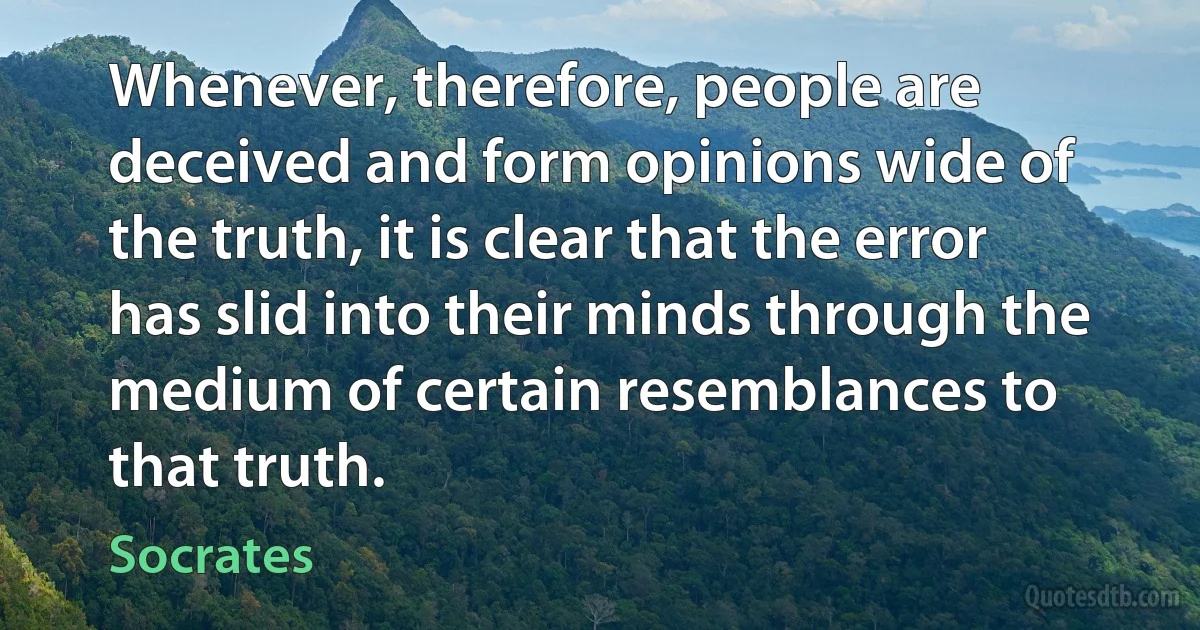Wide Quotes - page 37
When I have fears that I may cease to be
Before my pen has glean'd my teeming brain,
Before high piled books, in charact'ry,
Hold like rich garners the full-ripen'd grain;
When I behold, upon the night's starr'd face,
Huge cloudy symbols of a high romance,
And think that I may never live to trace
Their shadows, with the magic hand of chance;
And when I feel, fair creature of an hour!
That I shall never look upon thee more,
Never have relish in the faery power
Of unreflecting love! - then on the shore
Of the wide world I stand alone, and think
Till Love and Fame to nothingness do sink.

John Keats
Much have I traveled in the realms of gold, And many goodly states and kingdoms seen; Round many western islands have I been Which bards in fealty to Apollo hold. Oft of one wide expanse had I been told That deep-brow'd Homer ruled as his demesne, Yet did I never breathe its pure serene Till I heard Chapman speak out loud and bold: Then felt I like some watcher of the skies When a new planet swims into his ken; Or like stout Cortez when with eagle eyes He stared at the Pacific, and all his men Look'd at each other with a wild surmise, Silent, upon a peak in Darien.

John Keats
The existence of exotic dark matter particles outside the standard model of particle physics constitutes a central hypothesis of the current standard model of cosmology (SMoC). Using a wide range of observational data I outline why this hypothesis cannot be correct for the real Universe.

Pavel Kroupa
As I walk through my beloved Krakowski Park and pass by a group of young people from which I can smell beer, I give them a wide berth. But when I feel the weed, I go boldly through their group and sometimes chat. Yes, the abuse of marijuana causes trouble with memory, concentration, but it is a short-lived condition. I'm not talking about extreme cases, but there are few of them. Less than after alcohol. Oneself should sometimes detach from reality to deal with it somehow.

Jerzy Vetulani
It's a highly effective way of spreading ideas, information and content. Don't be distracted by the 140-character limit. A lot of the best tweets are links. It's instantaneous. Its reach can be immensely far and wide.Why does this matter? Because we do distribution too. We're now competing with a medium that can do many things incomparably faster than we can. It's back to the battle between scribes and movable type. That matters in journalistic terms. And, if you're trying to charge for content, it matters in business terms. The life expectancy of much exclusive information can now be measured in minutes, if not in seconds.

Alan Rusbridger
Wide open and unguarded stand our gates,
Named of the four winds, North, South, East and West;
Portals that lead to an enchanted land...
Here, it is written, Toil shall have its wage
And Honor honor, and the humblest man
Stand level with the highest in the law.
Of such a land have men in dungeons dreamed
And with the vision brightening in their eyes
Gone smiling to the fagot and the sword.
O Liberty, white Goddess! is it well
To leave the gates unguarded? On thy breast
Fold Sorrow's children, soothe the hurts of Fate,
Lift the down-trodden, but with hand of steel
Stay those who to thy sacred portals come
To waste the gifts of Freedom.

Thomas Bailey Aldrich
Greek tragedy met her death in a different way from all the older sister arts: she died tragically by her own hand, after irresolvable conflicts, while the others died happy and peaceful at an advanced age. If a painless death, leaving behind beautiful progeny, is the sign of a happy natural state, then the endings of the other arts show us the example of just such a happy natural state: they sink slowly, and with their dying eyes they behold their fairer offspring, who lift up their heads in bold impatience. The death of Greek tragedy, on the other hand, left a great void whose effects were felt profoundly, far and wide; as once Greek sailors in Tiberius' time heard the distressing cry 'the god Pan is dead' issuing from a lonely island, now, throughout the Hellenic world, this cry resounded like an agonized lament: 'Tragedy is dead! Poetry itself died with it! Away, away with you, puny, stunted imitators! Away with you to Hades, and eat your fill of the old masters' crumbs!'

Friedrich Nietzsche
But for Socrates, tragedy did not even seem to "tell what's true", quite apart from the fact that it addresses "those without much wit", not the philosopher: another reason for giving it a wide berth. Like Plato, he numbered it among the flattering arts which represent only the agreeable, not the useful, and therefore required that his disciples abstain most rigidly from such unphilosophical stimuli - with such success that the young tragedian, Plato, burnt his writings in order to become a pupil of Socrates.

Friedrich Nietzsche
Let every declamation turn upon the beauty of liberty and virtue, and the deformity, turpitude, and malignity, of slavery and vice. Let the public disputations become researches into the grounds and nature and ends of government, and the means of preserving the good and demolishing the evil. Let the dialogues, and all the exercises, become the instruments of impressing on the tender mind, and of spreading and distributing far and wide, the ideas of Righteousness and the sensations of freedom.
In a word, let every sluice of knowledge be opened and set a-flowing.

John Adams
I see you standing on the other side.
I don't know how the river got so wide.
I loved you, baby, way back when.
And all the bridges are burning that
We might have crossed and I feel so close to everything that we've lost.
We'll never, we'll never have to lose it again.Now I bid You farewell, I don't when I'll be back.
They're moving us tomorrow to that tower down the track.
But you'll be hearing from me, baby, long after I'm gone.
I'll be speaking to you sweetly
From a window in the Tower Of Song.

Leonard Cohen
Senator Kennedy has for years, also been a dynamic leader on a wide range of other issues of central importance to the people of this Nation, including education, raising the minimum wage, defending the rights of workers and their families, strengthening civil rights laws, assisting individuals with disabilities, fighting for cleaner water and cleaner air, and protecting Social Security and Medicare for senior citizens.

Ted Kennedy



